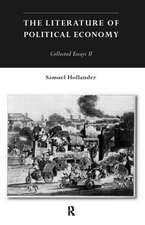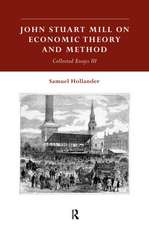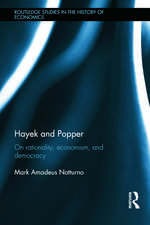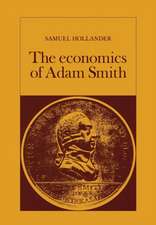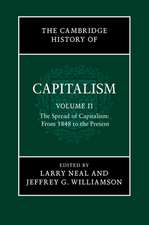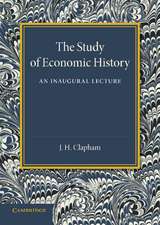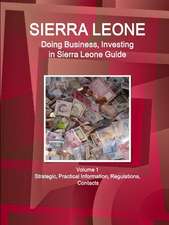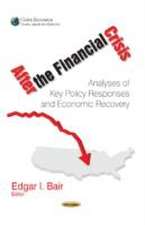Essays on Classical and Marxian Political Economy: Collected Essays IV: Routledge Studies in the History of Economics
Autor Samuel Hollanderen Limba Engleză Paperback – 4 mar 2015
Highlights include two issues of particular current relevance. Conspicuous is an extensive chapter regarding Adam Smith’s often neglected arguments for government intervention in the economy to correct market failures, and his critical view of the business class as an anti-social force. Important economists considered in relation to Adam Smith’s position on the role of the state include Jeremy Bentham and the Scottish-Canadian John Rae. Similarly of high present-day interest is a re-examination of Karl Marx’s theory of exploitation, or the notion of profits as "embezzlement," demonstrating Marx’s effective abandonment of this perspective in the case of the small active businessman as distinct from the major joint-stock corporation.
Other papers demonstrate the close intellectual relationship between David Ricardo and Thomas Robert Malthus; the extensive common ground between the British school and the French under the leadership of Jean-Baptiste Say; the failure of a so-called anti-Ricardian opposition in Britain represented by Samuel Bailey; and the denial of a sharp discontinuity between "classical" and later "neo-classical" economics.
Finally, several biographical essays are included as well as an extension of the autobiographical account appearing inCollected Essays II.
| Toate formatele și edițiile | Preț | Express |
|---|---|---|
| Paperback (1) | 475.70 lei 6-8 săpt. | |
| Taylor & Francis – 4 mar 2015 | 475.70 lei 6-8 săpt. | |
| Hardback (1) | 1072.35 lei 6-8 săpt. | |
| Taylor & Francis – 31 ian 2013 | 1072.35 lei 6-8 săpt. |
Din seria Routledge Studies in the History of Economics
-
 Preț: 378.26 lei
Preț: 378.26 lei -
 Preț: 316.51 lei
Preț: 316.51 lei -
 Preț: 302.55 lei
Preț: 302.55 lei - 9%
 Preț: 1003.12 lei
Preț: 1003.12 lei -
 Preț: 324.46 lei
Preț: 324.46 lei -
 Preț: 311.28 lei
Preț: 311.28 lei -
 Preț: 326.99 lei
Preț: 326.99 lei -
 Preț: 326.82 lei
Preț: 326.82 lei -
 Preț: 665.69 lei
Preț: 665.69 lei - 9%
 Preț: 935.40 lei
Preț: 935.40 lei -
 Preț: 395.82 lei
Preț: 395.82 lei -
 Preț: 280.74 lei
Preț: 280.74 lei -
 Preț: 318.31 lei
Preț: 318.31 lei -
 Preț: 392.72 lei
Preț: 392.72 lei - 8%
 Preț: 392.82 lei
Preț: 392.82 lei -
 Preț: 310.43 lei
Preț: 310.43 lei -
 Preț: 214.15 lei
Preț: 214.15 lei -
 Preț: 399.71 lei
Preț: 399.71 lei -
 Preț: 157.37 lei
Preț: 157.37 lei - 28%
 Preț: 850.91 lei
Preț: 850.91 lei - 27%
 Preț: 995.39 lei
Preț: 995.39 lei - 18%
 Preț: 1005.04 lei
Preț: 1005.04 lei - 18%
 Preț: 1002.60 lei
Preț: 1002.60 lei - 28%
 Preț: 1046.46 lei
Preț: 1046.46 lei - 18%
 Preț: 1280.31 lei
Preț: 1280.31 lei - 18%
 Preț: 1055.51 lei
Preț: 1055.51 lei - 18%
 Preț: 1055.51 lei
Preț: 1055.51 lei - 28%
 Preț: 987.72 lei
Preț: 987.72 lei - 28%
 Preț: 824.17 lei
Preț: 824.17 lei - 18%
 Preț: 1061.93 lei
Preț: 1061.93 lei - 18%
 Preț: 716.32 lei
Preț: 716.32 lei - 18%
 Preț: 1006.07 lei
Preț: 1006.07 lei - 18%
 Preț: 1069.92 lei
Preț: 1069.92 lei - 15%
 Preț: 342.67 lei
Preț: 342.67 lei - 18%
 Preț: 1056.00 lei
Preț: 1056.00 lei - 28%
 Preț: 991.34 lei
Preț: 991.34 lei - 18%
 Preț: 1076.53 lei
Preț: 1076.53 lei - 18%
 Preț: 698.08 lei
Preț: 698.08 lei - 25%
 Preț: 332.02 lei
Preț: 332.02 lei - 18%
 Preț: 1169.78 lei
Preț: 1169.78 lei - 18%
 Preț: 1059.84 lei
Preț: 1059.84 lei - 30%
 Preț: 852.88 lei
Preț: 852.88 lei - 25%
 Preț: 830.10 lei
Preț: 830.10 lei - 18%
 Preț: 1119.93 lei
Preț: 1119.93 lei - 18%
 Preț: 1062.98 lei
Preț: 1062.98 lei - 18%
 Preț: 953.01 lei
Preț: 953.01 lei
Preț: 475.70 lei
Nou
Puncte Express: 714
Preț estimativ în valută:
91.05€ • 98.94$ • 76.53£
91.05€ • 98.94$ • 76.53£
Carte tipărită la comandă
Livrare economică 21 aprilie-05 mai
Preluare comenzi: 021 569.72.76
Specificații
ISBN-13: 9781138903692
ISBN-10: 1138903698
Pagini: 432
Dimensiuni: 156 x 234 mm
Greutate: 0.6 kg
Ediția:1
Editura: Taylor & Francis
Colecția Routledge
Seria Routledge Studies in the History of Economics
Locul publicării:Oxford, United Kingdom
ISBN-10: 1138903698
Pagini: 432
Dimensiuni: 156 x 234 mm
Greutate: 0.6 kg
Ediția:1
Editura: Taylor & Francis
Colecția Routledge
Seria Routledge Studies in the History of Economics
Locul publicării:Oxford, United Kingdom
Public țintă
Postgraduate and UndergraduateCuprins
Preface Acknowledgements Part I: Adam Smith 1. Adam Smith: Market-Failure Pioneer, and Champion of ‘Natural Liberty’ 2. John Rae and Adam Smith (1998) 3. Jeremy Bentham and Adam Smith on the Usury Laws: a ‘Smithian’ Reply to Bentham and a New Problem (1999) Part II: The Classical Canon: Ricardo, Bailey, Say, and Sraffa 4. The Canonical Classical Growth Model: Content, Adherence and Priority (1998) 5. Samuel Bailey and the Question of his ‘Influence’: a Sceptical View (2010) 6. Jean-Baptiste Say and the Classical Canon in Economics: Land-Based Growth Theory (2005) 7. Ricardo as a ‘Classical’ Economist; the ‘New View’ Re-examined: a Reply to Dr Peach (2007) 8. The Old ‘New View’ Reaffirmed: a Truly Final Word? 9. Sraffa in Historiographical Perspective: a Provisional Statement (1998) 10. Reply to Stirati’s Comment on my ‘Sraffa and the Interpretation of Ricardo: the Marxian Dimension’ (2011) Part III: Malthus 11. Malthus and Classical Economics: the Malthus–Ricardo Relationship (2001) 12. Malthus and Method: a Study in Irony (1999) 13. Malthus and the Corn-Profit Model (2000) 14. New Avenues for Research in Malthus Studies; On Hashimoto and Pullen’s ‘Two Unpublished Letters of Malthus’ (2006) 15. An Invited Comment on ‘Reappraisal of "Malthus the Economist", 1933–1997’ by A.M.C. Waterman (1998) Part IV: Marxian Political Economy 16. Engels–Marx versus Malthus on Distribution and the Population Issue (2003) 17. On the Marxian Entrepreneur: Karl Marx’s Abandonment of the Doctrine of Exploitation under Industrial Capitalism (2011) 18. On Karl Marx’s Doctrine of Exploitation: a Reply to Critics Part V: Biographical Perspectives 19. John P. Henderson’s Life and Economics of David Ricardo (2001) 20. Martin Bronfenbrenner as a Comrade-in-Arms in establishing the ‘New Classical Economics’ (1999) 21. Continuing a Conversation with Larry Moss (1945–2009) (2010) 22. Afterword: A Memoir Continued
Notă biografică
Samuel Hollander is University Professor Emeritus at the University of Toronto, Canada, where he served on the faculty from 1963 to 1998, and is currently affiliated with the Department of Economics at Ben-Gurion University, Israel. An Officer of the Order of Canada and a Fellow of the Royal Society of Canada, Professor Hollander holds an honorary Doctorate of Laws from McMaster University, Ontario, Canada, and was a Research Director at the Centre National de la Recherche Scientifique (CNRS) of France, 1999-2000.
Descriere
Samuel Hollander’s work has been provoking debate for over four decades. This book brings together key contributions of work from recent years, in addition to some brand new pieces. The essays are introduced by a preface, in which Hollander offers reflects on his past work and reactions to it.


